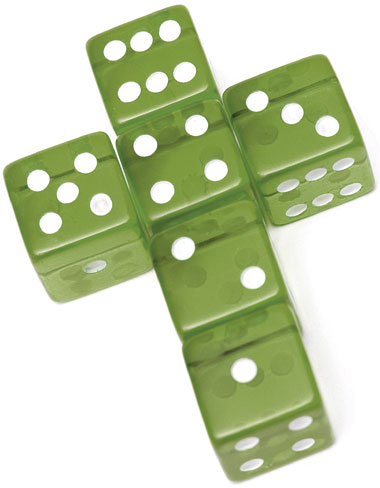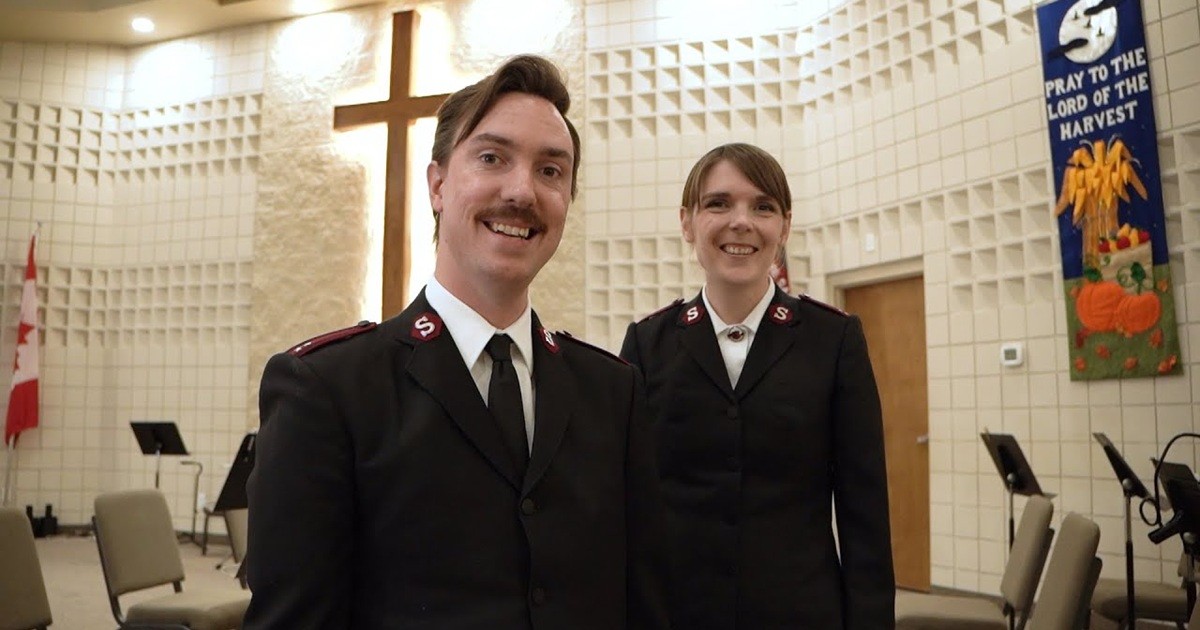This is the second in a series of Point Counterpoint debates in which a variety of Salvationists will explore two sides of an issue that is critical to Army mission.

Yes, “tainted” money can be redeemed. Our concern is not with how the wealthy spend their money, but how we can stand in solidarity with the poor.
BY ROB PERRY
In this age of Lotto 649, Pro-line, 50-50 draws and PartyPoker.net, many of us know someone who has been adversely affected by gambling. Gambling addiction is a serious problem. However, this is not an argument as to the harmfulness or morality of gambling. Rather it is a discussion as to whether The Salvation Army's integrity would be compromised by accepting donations that come from the proceeds of gambling.
Micah 4 tells of a future filled with peace, prosperity and joy. It speaks of nations that turn to God and others that don't. The chapter concludes: “ 'I will give you hooves of bronze, and you will break to pieces many nations.' You will devote their ill-gotten gains to the Lord, their wealth to the Lord of all the earth” (Micah 4:13).
This is the culmination of Micah's vision of Israel defeating its enemies and restoring peace. The plunder or “ill-gotten gains” of wicked nations will be taken by Israel and used for God's glory. Something that was meant for evil can be transformed into something life-giving. As Joseph said to his brothers after they mistreated him, “You intended to harm me, but God intended it for good to accomplish what is now being done, the saving of many lives” (Genesis 50:20). It's about redemption.
The same was true for Zacchaeus, the diminutive tax collector whose life was changed when he encountered Jesus. Appropriately, Zacchaeus' approach to finances reflected his new life: “Zacchaeus stood up and said to the Lord, 'Look, Lord! Here and now I give half of my possessions to the poor, and if I have cheated anybody out of anything, I will pay back four times the amount' ” (Luke 19:8).
Jesus does not stand up and say, “Hold on, Zacchaeus. While I appreciate the sentiment, you earned your money cheating your own people and colluding with Rome; therefore it is tainted money, and it is wrong for you to give it to the poor.” Instead, Jesus is silent on the issue.
It's about redemption, but also about identification. As The Salvation Army, do we align ourselves primarily with the wealthy individuals and corporations who donate, or do we mostly identify with the underprivileged who are the beneficiaries of these donations? If it is the donor, we must be careful to walk alongside them in truth, and be prophetic about how they should make and spend their money. However, I believe that The Salvation Army's primary identification must be with the poor. It is our privilege to stand alongside the beneficiaries: the homeless, the addicted, the starving. While the Bible has much to say about how the rich should acquire and spend their wealth, it is decidedly quiet about where the poor should find their help.
As someone who lives and works in an underprivileged community, part of my job is to be a surrogate beggar, more commonly known as a fundraiser. When I have the privilege to rub elbows with wealthy individuals or corporations to whom my people have no access, I get to “beg” on their behalf. It is one of my least favourite parts of my job. It is humiliating to me (as begging always is), and if I am not careful, it can border on exploitation. Yet I do it because the people I am representing need the programs and help this money will offer. After all, the money I raise is not for me; I am just the middleman.
If I asked the people in my community if they were concerned whether or not program money comes from the proceeds of gambling, their reaction would be confusion and incredulity. Most of them receive aid from other social service providers that are funded in part by gambling. Some of them even dream about the vast sums they will donate to The Salvation Army when they win the lottery. They do not care where our money comes from any more than a beggar on the streets of Jerusalem would have cared where Zacchaeus got the money to put in his cup. And nowhere in the Bible does God tell them they should worry about it.
When William Booth was criticized about receiving “tainted money” from wealthy donors, he replied, “We will wash it in the tears of the widows and the orphans and lay it on the altar of humanity.” In his words we find identification with the poor and redemption for the lost. Instead of piously turning aside proceeds from gambling, we can accept the gift, pray for the giver and use the money for the good of the poor.
Rob Perry is the ministry co-ordinator at Corps 614 in Regent Park, Toronto.
No, accepting gambling funds is hypocritical and weakens our prophetic voice. When it comes to gambling, our words must match our actions.
BY CAPTAIN RICK ZELINSKY
 My counterpart in the “yes” camp has invoked our Founder's words about cleansing filthy, sinful dollars in the tears of the poor. If only the issue of taking gambling dollars were that easy. But the practical benefit of accepting gambling revenue clashes with the Army's ethical stance and covenantal relationship.
My counterpart in the “yes” camp has invoked our Founder's words about cleansing filthy, sinful dollars in the tears of the poor. If only the issue of taking gambling dollars were that easy. But the practical benefit of accepting gambling revenue clashes with the Army's ethical stance and covenantal relationship.
My previous corps in Williams Lake, B.C., was positioned across the street from the city's only bingo hall. It was disheartening to see people lining up to gamble away their money only to end up crossing the street for assistance with food. Our corps was a sign of hope; the bingo hall a sign of hopelessness.
When asked about the Army's stance on gambling, I would always reply, “My family will not go hungry if I spend a loonie or even $20 a week on the lottery, but our people lining up for bingo will. So, as Christians, we choose to abstain.” I say “we” because our faith is more than a personalized shopping list of choices—it is the life of the body of Christ, the Church lived out in community.
We must continually ask what it means to live as Jesus' followers. When we accept gambling funds, do we fund our services on the backs of those we seek to save? Are we complicit in the deception that gambling leads to wealth and happiness?
Perhaps a better question is, Are we taking full advantage of our prophetic voice to the community? Theologian John Howard Yoder notes that it's hard for the Church to be prophetic when it's tied to government dollars. Without a clear distinction between church and state, writes Yoder, “Social ethics means not what everyone should think and do about social questions, but what people in power should be told to do with their power.” Christian “morality” becomes another means by which the state enforces its will.
Refusing gambling money signals our unwillingness to collaborate with a corrupt system. As Yoder puts it, we must not “use unworthy means even for what seems to be a worthy end.” This strengthens our solidarity as a covenanted people and maintains a consistent testimony to the world.
It should be noted that the biggest beneficiary from gambling in Canada is our government. Revenue from gambling helps fund our health care and education. Does that mean I'm complicit in gambling if I visit the doctor or go to school? Of course not. Christians have to live in the world. We can't reduce our hospital stay by 20 percent in protest. We can, however, approach our local school boards and offer to help with fundraising that doesn't involve gambling to reduce dependency on those funds.
At a minimum, the Army should refuse grants from gambling revenues. In our community, receiving such a grant would have given permission to the Lottery Corporation to advertise our organization as a recipient. Translation? Bingo dollars are good for the community and social work agencies. There are strings attached to those dollars and a price to be paid.
So how do we compete in the non-profit marketplace without relying on gambling? It sounds easy, but the answer is faith. God doesn't ask us to accomplish what he cannot provide for. James tells us “we have not because we ask not,” and the gospel writers remind us to “ask and it will be given.” This doesn't mean we “hunker in our bunker” and wait for the cash, but if we are doing all we can, then God will provide.
Part of our prophetic stance requires us to recommit our time and resources to God's work. In most corps, the majority of funding comes from a small percentage of the congregation. Fewer and fewer corps in this territory are self-supporting. Many corps that struggle financially may be tempted to take the tainted money just to survive. The best way to stave off temptation is to redouble our generosity.
In Williams Lake, our corps took a public stance against bringing a casino to the city. We called on local government to take the high road for the sake of all its citizens. A building contractor for the casino told me, “Rick, I think you're out of your mind on this—but I gotta hand it to you, you're consistent.”
May our words always match our actions.
Captain Rick Zelinsky is the director of field education at the College for Officer Training in Winnipeg. Visit www.cfot.ca.









In New Zealand we have an organisation called Pub Charities. And the collect the proft from slot poker machines in pubs and distrubute the money. They provide the money to many community groups and this has included Salvation Army community projects and services. Not to long ago the decision was made by the Leaders of the Salvation Army to no longer accept money form this group. It was interesting to wonfer where we were going to replace the money given through such proceeds as poker machines. Yet now 18 months later and in the middle of the world wide recession God has been faithful to that choice. Public donations have risen to more than compenstate the lost of revenue. Does this mean we should not accept tainted money. William Booth is to have said that the only problem with tainted money is that there in taint enough. I feel we need to becareful where money does come from but if we have question then as in all things we should seek God's will and maybe that will be to take a stand.